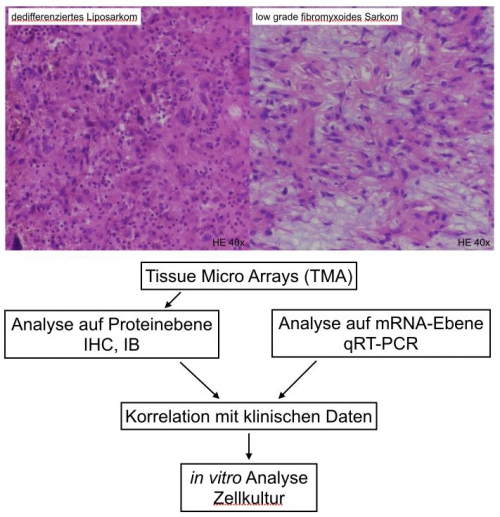Subproject 9: The contribution of eukaryotic initiation factors to the formation of tumors and the progression of sarcomas
Institute of Pathology: Haybäck H
Clinic for General, Visceral and Vacular Surgery: Wex C
Clinic for Hematology and Oncology: Fischer T, Wolleschak D
Sarcomas are a widely diverse type of tumor with more than 70 known subtypes (1). The large morphological and molecular heterogeneity presents a challenge to the daily routine at clinics. Because of this, a more detailed investigation of the molecular profile of this complex type of tumor is necessary. It has already been shown, that an increased activation of the m-TOR signal path plays an important role in the development of sarcomas (2). This signal path is especially associated with the translation initiation, which is controlled by eukaryotic initiation factors (eIFs) (3,4). The goal of this study is to use eIFs as biomarkers and as a potential approach to investigate new therapy methods.
(1) Dancsok AR, Asleh-Aburaya K, Nielsen TO. Advances in sarcoma diagnostics and treatment. Oncotarget. 2016.
(2) Setsu N, Kohashi K, Fushimi F, Endo M, Yamamoto H, Takahashi Y, et al. Prognostic impact of the activation status of the Akt/mTOR pathway in synovial sarcoma. Cancer. 2013;119(19):3504-13.
(3) Silvera D, Formenti SC, Schneider RJ. Translational control in cancer. Nature reviews Cancer 2010;10(4):254-66.
(4) Watkins SJ, Norbury CJ. Translation initiation and its deregulation during tumorigenesis. British journal of cancer. 2002;86(7):1023-7.

Figure: Assortment of tissue micro arrays of different sarcoma subtypes. The material was analyzed at the protein level using immunohistochemistry (IHC) and immunoblots (IB) and on the mRNA level using qRT-PCR. The results were correlated with clinical data (tumor state, survival rate, etc.). Based on this basic characterization, studies were carried out on individual eIF subunits in vitro (cell cultures).






